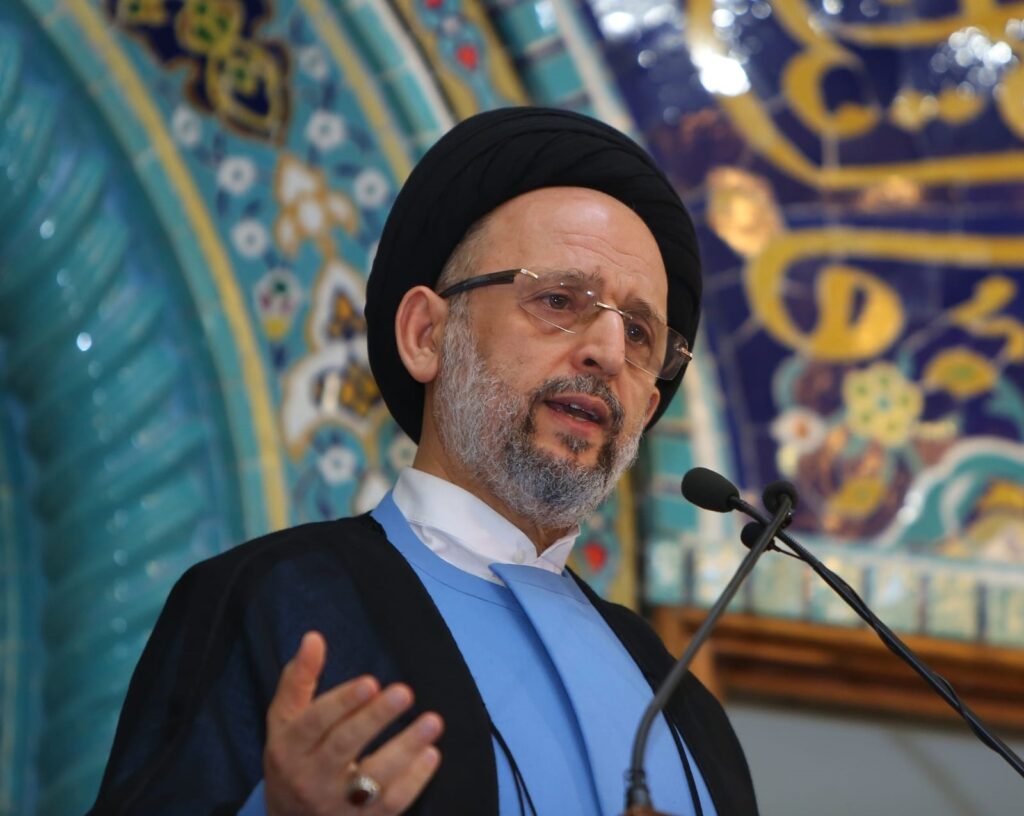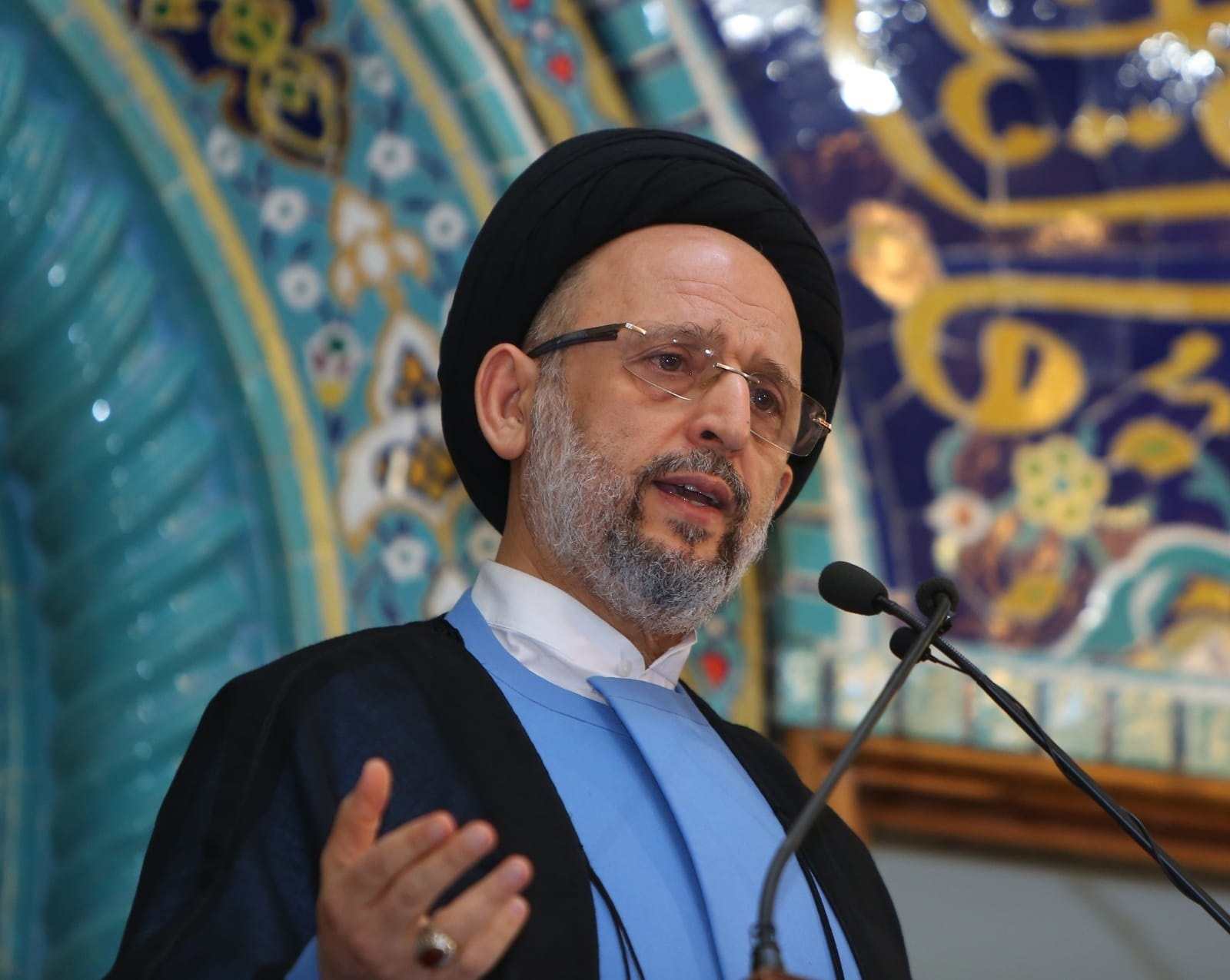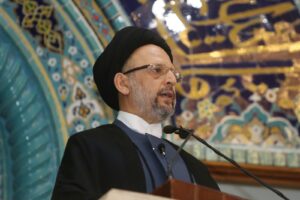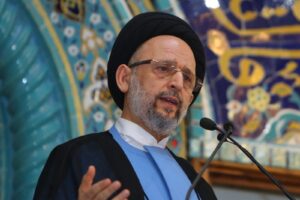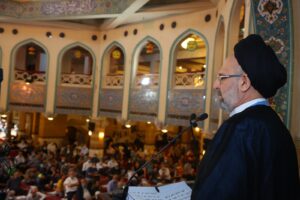Al-Kazim: Distinction and Suffering The First Sermon
His Eminence, Sayyed Ali Fadlallah, delivered the two Friday prayer sermons at the Imamain Al-Hassanain Mosque, RAJAB 24, 1446/January 24, 2025. Several prominent religious scholars, dignitaries, and hundreds of believers attended the Jumu’a prayer. Following is a summary of the sermons
Al-Kazim: Distinction and Suffering
The First Sermon
Allah says in His Glorious Book: “{And We made them leaders guiding by Our command and We inspired them to do good deeds, establish prayer, and give alms. And they worshipped Us}” [Quran 21:73].
We commemorate on the twenty-fifth of the sacred month of Rajab, the death anniversary of Imam Musa ibn Ja’far al-Kazim. Imam al-Sadiq (a.s.) expressed his position saying: “Praise be to God who made you an (outstanding) successor to your fathers, a joy for your children, and a substitute for friends.”
Sheikh al-Mufid mentioned in his book “Al-Irshad” that he was: “The most devoted worshipper of his time, the most knowledgeable, the most patient, the most generous, and the noblest of souls. He would visit the poor of Medina at night, bringing them food without them knowing it was him.” The Imam was known by his titles: the Righteous Servant, Al-Kazim, and the Gate to the Needs of God.
Imam al-Kazim assumed the responsibility of the Imamate after the death of his father, Imam al-Sadiq , at the age of twenty. He suffered throughout his Imamate, which lasted for thirty-five years, from the oppression of the Abbasid rulers, particularly during the reign of the tyrant Haroun al-Rashid.
Haroun al-Rashid feared Imam al-Kazim despite his vast empire. This fear stemmed from the respect and love people had for the Imam, leading Haroun to attempt to restrain his movements and eventually imprison him. The Imam spent seven years in prison intermittently until Haroun ordered his jailer to poison him.
In this sorrowful occasion, we reflect on some of the stances that demonstrated the Imam’s courage and strength in confronting Haroun al-Rashid’s tyranny.
The first stance occurred when Haroun al-Rashid visited the Prophet’s tomb in Medina and greeted Prophet Muhammad (p.) as his cousin to claim that he was the closest to the Messenger.. Imam al-Kazim responded by greeting the Prophet as his father, emphasizing his direct descent.
When Harun questioned this, suggesting lineage is through fathers not mothers, the Imam told him that it seems that he has not read the Quran . Then he cited the verse revealed during the Mubahala event, highlighting his direct descent from the Prophet through his daughter Fatima.
The second stance happened when Haroun offered to return Fadak that was taken from Fatima . The Imam stated he would accept it only with its historical boundaries, which encompassed the entire Islamic empire. This response indicated that Fatima’s demand was not for personal gain but to highlight the injustice and rightful leadership.
Imam al-Kazim ultimately suffered imprisonment and martyrdom due to his unwavering stance against tyranny.
The Third Incident: Haroun al-Rashid sent his minister Yahya ibn Khalid al-Barmaki to the Imam after he had spent a long time in prison, to inform him that he was willing to release him on the condition that he apologized. However, Imam al-Kazim refused and said to him: “Go to him and tell him: ‘O Haroun, no day of hardship passes over me without it also ending a day of ease for you, until we all reach a day with no end, where the wrongdoers will lose.'”
Imprisonment was his choice; he would not accept a humiliating freedom, a freedom that would silence him from speaking out against the oppression of the tyrants, from speaking the truth, supporting the oppressed, and denouncing the deviation that was intended to be legitimized for people to accept.
Therefore, the Imam did not complain about his imprisonment… Instead, he praised God for it and saw it as an opportunity for worship. He said: “O God, You know that I used to ask You to free me for Your worship; O God, You have done so, so to You be praise.”
He did not seek anyone’s intercession to be released from prison. So when he was told: “If you could have someone intercede for you with Haroun,” he said: “My father told me from his fathers that God, the Exalted, revealed to David: ‘O David, if any of my servants seeks refuge with someone other than Me…I will cut off the means of the heavens from him and will sink the earth beneath him.'”
Dear loved ones: this is Imam al-Kazim, these are his stances that we should always remember when confronting the oppression, tyranny, and corruption we suffer from. We should not accept all of this, and we should raise our voices against it, even if it becomes a reality. We should not fear anyone’s blame for the sake of God to achieve the best form of jihad, as it is stated in the hadith: “The best jihad is a word of truth before a tyrannical ruler,” when it requires patience to attain what is promised to the patient: {Indeed, the patient will be given their reward without measure} [Quran 39:10]. In this way, we will truly be his followers, Shiites, and loyalists.
The Second Sermon
Servants of God, I advise you and myself with what Imam al-Kazim advised one of his companions, Safwan al-Jammal, when he said to him : O Safwan, everything from you is good and beautiful except for one thing.” He said: “May I be your ransom, what is it?” He said: “Your renting your camels to this man – meaning Haroun al-Rashid, the Abbasid caliph”. He said: “By God, I did not rent my camels for hunting or games, but I rented them for this road – meaning the road to Mecca, for Hajj – and I do not accompany them, but send my servants with them.” He (a.s.) said: “Do you wish for their survival until your rent is paid?” I said: “Yes.” He said: “Whoever loves their survival is one of them, and whoever is one of them will be thrown into the fire. Did you not hear God’s saying: {And do not incline toward those who do wrong, lest the fire should touch you} [Quran 11:113].”
Dear loved ones: The Imam wanted to teach his companion, Safwan, and through him, us, not to aid an oppressor or a corrupt person, even to the extent of wishing for their continued life, so that the oppressors do not find anyone to support them and secure their presence. When they become strong, it is not only due to their capabilities but also because of those who stand with them, support them, justify their actions, and fight on their behalf. In this way, we make our environment more just, upright, and capable of facing challenges.
Starting with the government that the Lebanese await to be formed as soon as possible to play its role in this difficult phase they are going through, to address the aftermath of the Zionist aggression and to reconstruct what was destroyed, or to address their living and daily suffering, or to face potential threats from what is happening in the region and the world, which are witnessing significant political, economic, and security transformations that may not spare them. They hope that the government to be formed will meet their expectations and ambitions and be a reflection of the promises indicated in the inaugural presidential speech to work on regulating state institutions, repairing what has been corrupted, and considering the balances that still govern this country on sectarian and political levels. The selection should be for those with competence, transparency, integrity, and a clean history, serving all Lebanese, not just the sect or party they belong to or those who brought them to their position.
The Lebanese have suffered and continue to suffer from those who have brought the country to its current predicament, and they now long for someone to pull them out of it, restoring their trust in this country and their hope of staying in it. This will not happen unless the political forces that hold the decision in this country decide to move beyond their accustomed personal calculations and factional interests to consider the nation’s interest and serve all its people.
Meanwhile, the Lebanese army continues its deployment in the areas occupied or reached by the Zionist enemy, revealing the extent of the massive destruction left by the enemy in the buildings and infrastructure of these towns. However, the enemy continues its barbaric demolition and bombing operations in the villages and towns it still occupies, aiming to make the border area lifeless, which it will not achieve as long as the people of this strip cling to their land and insist on staying there.
Here, we must warn of the enemy’s intention to remain beyond the stipulated sixty days and not withdraw from some locations to achieve security and political gains. This calls for serious action by the Lebanese state to press the countries sponsoring this agreement to confront any breach of its terms and to fulfill their responsibilities and commitments for its full implementation. We still hope that the enemy will withdraw despite its maneuvers on security and political levels, to appear as if it holds the primary decision on withdrawal.
We commend the efforts of the Lebanese security agencies to confront the enemy’s attempts to penetrate the Lebanon by recruiting spies, which led to the arrest of several of them. We call for all necessary measures to prevent the enemy from achieving its goals in this regard and to deter those who would betray their country and its security. We call for cooperation with security agencies in this effort and to be vigilant to protect the country from infiltration. Here, the importance of family members of spies taking decisive stances to denounce them and their actions becomes clear.
At the same time, we see the danger in the cowardly assassination of one of the religious scholars in the Western Bekaa, a symbol of resistance there, Sheikh Muhammad Hamadi. The enemy’s intelligence or its tools might have been behind it, calling for alertness and deterring attempts to incite strife in this area.
After the Zionist war machine stopped in Gaza, the enemy continued its aggression in Jenin and the West Bank, aiming to complete its project started in Gaza, to uproot the Palestinian people and end their cause.
Here, we commend the resistance of this people who insist on facing the enemy’s arrogance and military might, and who will thwart its goals with their steadfastness and perseverance despite the destruction and killing. We renew our call to Arab and Islamic countries and the free people of the world not to leave the Palestinian people alone in this battle, to support and stand with them.
We also renew our call for the Palestinian Authority to play an active role in defending its people and preventing the enemy from exploiting any internal Palestinian disputes, as it has become clear that this enemy does not differentiate between the resistance factions and the authority, but aims to tighten its control over all of Palestine.
